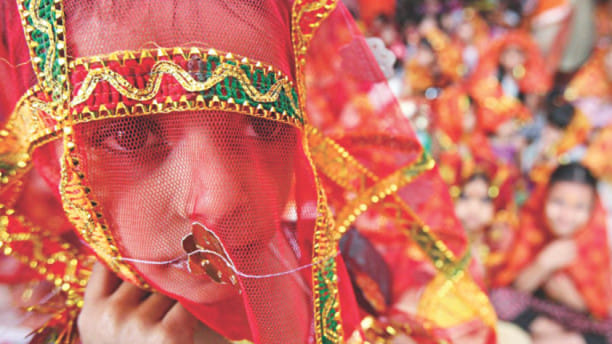Robbing our children of their childhood

Jharna (not her real name), a 14-year-old girl living in Rayerbazar slum in Dhaka, fears that all her dreams may be dashed because of early marriage as she is from a community that expects girls to be married off and bear children even before they reach adulthood. Jharna, who is a child, doesn't want that. "I want to complete my studies first and enjoy my childhood like other children living in rich areas," she opines.
As a nation we have done little to protect children like Jharna. A recent report titled "Stolen Childhood" released by the international child rights organisation, Save the Children, on June 1, 2017, coinciding with International Children's Day, gives a rather grim picture of the state of child rights in Bangladesh. The report includes End of Childhood index, where Bangladesh is ranked 134th out of 172 countries, and the major reasons for this are child marriage, early pregnancy, poor health, violence against children, malnutrition, exclusion from education and child labour.
The report says, in Bangladesh 44 percent of girls aged 15-19 are married, which is one of the highest in the world. Marriage before age 18 is a violation of children's rights. It ends a girl's childhood by forcing her into adulthood and motherhood before she is physically and mentally ready. Globally, a girl under 15 gets married every seven seconds and every two seconds a girl gives birth, according to the report. Half of all adolescent births occur in just seven countries, and Bangladesh is one of them along with Brazil, Democratic Republic of the Congo, Ethiopia, India, Nigeria and the United States. Babies born to adolescent mothers face a substantially higher risk of dying and mothers aged 15-18 are less likely to be in school and more likely to struggle economically. This puts them and their children at risk of exploitation, ill health and perpetuating cycles of poverty, eventually robbing them of their childhood.
The rate of malnutrition is also high in Bangladesh with 36.1 percent of children aged 0-59 months suffering from stunting. Globally, one of two-thirds of stunted children live in ten countries and Bangladesh holds the eighth position with 5.5 million stunted children. The report says, despite the progress in medical science, many countries still have very high under-five mortality and every day more than 16,000 children die before reaching their fifth birthday, mostly from preventable causes. In Bangladesh, under-five mortality rate is 38 deaths per 1,000 live births.
Education is a right of every child but worldwide there are 263 million children out of school and they are mostly from excluded groups or from disadvantaged backgrounds, often girls, who live in slums or hard-to-reach areas. Their childhood ends quickly as instead of going to school they are forced to work or get married.
The Government of Bangladesh, with assistance from development partners, has made significant progress towards achieving universal primary education and gender parity, but poor quality of education, high dropout rates, lack of equity and access to education still remain significant obstacles. According to the "Stolen Childhood" report, 28 percent of children are still out of school in Bangladesh.
In addition to that, children in Bangladesh are exposed to severe forms of physical and mental violence at home, workplace, institutions and other public places and it is increasing day by day.
All these factors are robbing a large number of children of their childhood in Bangladesh and at least 700 million children worldwide. This is the time for children to be in school and in the playground, to grow strong and confident with the love and encouragement of their family and extended community of caring adults, to live free from fear, be safe from violence and be protected from abuse and exploitation.
The 1989 UN Convention on the Rights of the Child (UNCRC), clearly defined childhood as a separate space from adulthood and recognised that what is appropriate for an adult may not be suitable for a child. Bangladesh, being a signatory to the 1989 UNCRC, must ensure that the childhood of every last child is protected.
If the government wants to achieve all the Sustainable Development Goals (SDGs), child rights should be at the heart of all development programmes as 40 percent of Bangladesh's population are children.
The government has introduced the 'child budget' in FY2015-16, but the question still remains, if the allocation is sufficient. In a recent view-exchange meeting on budget allocation for children, Deputy Speaker, M Fazle Rabbi Miah laid emphasis on more allocation for children in the national budget and proper use of allocated money. This year, Finance Minister AMA Muhith has proposed allocation of Tk 1,331.8 billion for an aggregate child-focused budget involving child-related programmes of 13 ministries and divisions for the next fiscal year. Proper monitoring of allocated money for children is equally important to ensure that the money is being used for every last child in Bangladesh.
It is unacceptable that in 2017 countless children in Bangladesh and around the world still do not have the right to learn, grow and play. If we are not even able to protect our children, how can we protect our future? If we—the politicians, businesspeople, social workers, teachers and media persons—do not act now, then we will be creating a much more dangerous world for generations to come.
The writer is Head of Communication and Media, Save the Children, Bangladesh.



 For all latest news, follow The Daily Star's Google News channel.
For all latest news, follow The Daily Star's Google News channel.
Comments